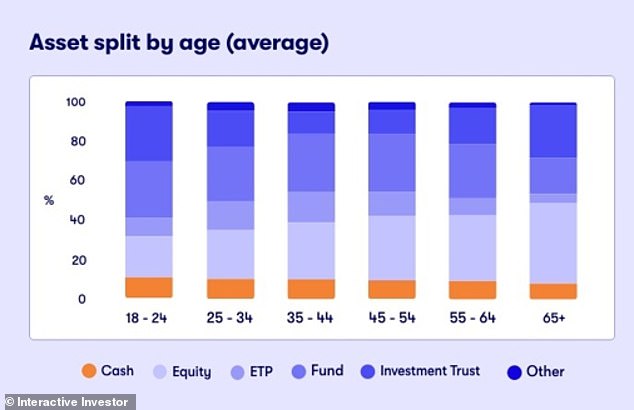- Every age group did enough to beat the FTSE 100’s return of 2.3% in Q4
- Young investors are more likely to hold investment trusts and passive funds
The youngest cohort of investors outperformed older Britons in the final three months of 2023 with the help of investment trusts and cheap passive funds, data suggests.
The Interactive Investor Private Performance Index shows the platforms’ users in the 18-to-24 category saw their portfolio value go up by an average of 6.4 per cent in the final three months of the year, narrowly edging out a return of 6.2 per cent for 25-to-34-year-olds.
Every age group did enough to beat the FTSE 100’s return of 2.3 per cent over the same period, but all trailed the FTSE World index’s gains of 6.9 per cent.

Outperforming: Gen Z investor portfolios score bumper fourth quarter
Despite a bumper fourth quarter, however, both of the youngest categories trailed a full-year return of 17.2 per cent for 2023’s top performers in the 35-to-44 category.
The youngest generation’s 16.6 per cent 2023 return, which compares to an average annual return of 14 per cent, was bolstered in the final quarter, as outsized exposure to investment trusts appeared to pay off.
Around 27.7 per cent of 18-to-24 year old’s portfolios were invested in investment trusts last year, which compares to an average of 20.2 per cent.
The only other generation with comparable exposure was the 65-plus category, with 26.8 per cent, while all other age groups had far less invested in investment trusts.

The youngest cohort of investors were the best performers in the final quarter of 2023
The average London-listed trust started 2023 with a discount to net asset value of 11.7 per cent, according to the Association of Investment Companies, before hitting a post-2008 trough of 16.9 per cent at the end of October and recovering to 9 per cent on 31 December.
Myron Jobson, senior personal finance analyst at Interactive Investor, said: ‘Younger investors have seemingly benefited from their higher-than-average exposure to investment trusts, many of which have seen discounts reduced off the back of an improved economic outlook.
‘Holding investment trust shares when they are trading at a discount while the ability for investment trust managers to gear can potentially produce a better return on the capital invested – although losses can be exacerbated during periods of underperformance.’

Splits: How different age groups are dividing their portfolios
What assets are young investors holding?
Alliance Trust was the most-held asset in 2023 among the youngest investors, according to Interactive Investor, followed by Scottish Mortgage, Fundsmith Equity and F&C Investment Trust.
Alliance Trust has delivered a 13.2 per cent share price return over one year, according to the AIC, while adding 14.9 per cent in net asset value total return.
Surprisingly, the 18-to-24 cohort held just 20.8 per cent of their portfolios in equities, compared to 24.8, 29 and 32.8 per cent in the 25-to-34, 35-to-44 and 45-54 categories.
In fact, the data suggests that the older the investor, the more likely they were to invest in equities.

Younger investors were more likely to back investment trusts than older peers
One exception for 18-to-24s is Lloyds Banking Group, which is the tenth largest holding among the age group.
Other top holdings in the age bracket were low cost passive funds offered by US giant Vanguard, whose funds were popular among all age groups.
The 18-to-24 cohort held the Vanguard FTSE Developed World ex-UK Equity Index, Vanguard Life Strategy 100 per cent Equity and its 80 per cent equity counterpart, and the Vanguard S&P 500 ETF.
The youngest investors were also sitting on a larger cash pile than any other category, with an average of 10.5 per cent of portfolios compared with an average of 8.9 per cent.
Jobson said: ‘Interestingly, the average cash holding as a proportion of Interactive Investor customers’ overall portfolios is a similar proportion, give or take one or two percentage points, as it has been for the past few years – even when interest rates were very low.
‘This suggests that while cash forms an important part of a well-diversified portfolio, our customers are intrinsically investors – often favouring to have easily accessible cash to invest where they see opportunity with minimal delay and faff.
‘Waning cash positions could point to growing confidence in equities following the easing of factors that have weighed on markets – namely inflation.’

Gender divide: The data also showed women outperformed men in the final quarter and from January 2020 to December 2023



